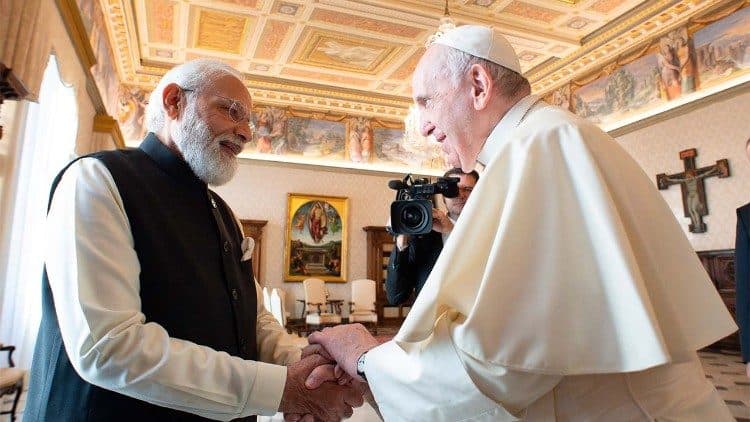MUMBIA – A month after Narendra Modi became only the second prime minister since independence in 1947 to be sworn in for a third term, the country’s Catholic leadership met with the Hindu nationalist leader to press him on religious freedom and the rights of Christian minorities, including members of the oft-neglected Dalit and Tribal groups.
In particular, the bishops raised concerns about ongoing violence in the northeastern state of Manipur which has pitted a majority Hindu ethnic group against a minority Christian population, with an estimated 70,000 Christians displaced and roughly 400 churches destroyed.
Afterwards, the bishops reported a cordial exchange but little immediate progress on the substantive matters they raised.
The meeting took place on Friday, with the Catholic delegation led by Syro-Malabar Archbishop Andrews Thazhath, President of the Catholic Bishops’ Conference of India, along with Bishop Joseph Mar Thomas of Bathery, the conference vice-president, and two other officials.
Thazhath presented Modi with a letter from the conference.
“On behalf of the Catholic Bishops Conference of India (CBCI), we extend our heartiest congratulations to you on the historic occasion of your assuming office as the Prime Minister of India for the third consecutive term,” the letter said.
“We assure you of our prayerful support as you continue to lead our nation with your charisma and vision in accordance with the Constitution of India,” the bishops wrote.
The bishops then expressed alarm over what they described as a rising tide of anti-Christian pressure.
“It is with a heavy heart that we express our anguish over the growing attacks on Christians and their institutions by antisocial elements in different parts of India,” they wrote. “There have been several instances of harassment and attacks under false allegations of forced conversions and the misuse of the anti-conversion laws.”
“We wish to clarify that the Church firmly opposes forced conversions,” they said.
“In solidarity with the people of Manipur, we urge you to intervene earnestly to bring peace and harmony in that state,” the bishops added.
Concerns about anti-Christian persecution in India have intensified since Modi’s Hindu nationalist movement came to power in 2014, and were recently echoed in a U.S. State Department annual report on religious freedom, which pointed to reports that “local police aided mobs that disrupted worship services over accusations of conversion activities, or stood by while mobs attacked them and then arrested the victims on conversion charges.”
The bishops placed special emphasis on the treatment of Christian Dalits, referring to members of the old “untouchable” class in India’s traditional caste system, as well as “tribals,” meaning members of the country’s Indigenous groups.
“We would like to bring to your attention that poor, Dalit, and tribal Christians often face discrimination and exclusion,” the bishops wrote.
“We appeal to you to extend reservation benefits to Dalit Christians, similar to those enjoyed by Dalits in other religious groups, so that there is no discrimination based on religion which is guaranteed in our Constitution,” the bishops said.
“In addition, we also appeal to you that the reservations provided to tribal Christians should be preserved intact and not withdrawn,” they said.
In India, reservation benefits refer to a form of affirmative action, promoting the presence of Dalits and Tribals in university admissions, hiring, political bodies and so on.
The letter emphasized the absence of Christians from a National Commission for Minorities and a National Commission for Minority Educational Institutions.
The bishops also complained that some Christian NGOs in India are facing what they described as legal and political harassment related to the renewal of their registration under Indian law as entities entitled to receive foreign donations.
According to Thazhath, during the meeting Modi acknowledged the bishops’ concerns but largely denied a government role in causing them.
“Our anxieties were heard in a way that he expressed solidarity, but he said every time (that) some fringe groups or somebody else is doing it. (That) it’s not the political party or government,” Thazhath said.
Thazhath said Modi did not give clear answers on the demands of Dalit Christians to be assigned reservation benefits, or concerns expressed by Tribal Christians about efforts in some states to deny them “scheduled tribe” status, another designation which triggers benefits for traditionally oppressed groups.
Going forward, these issues may prove especially challenging for Modi, who had been widely expected to win reelection in India’s recent elections. Nevertheless, his Bharatiya Janata Party (BJP) nevertheless failed to win an outright majority in parliament, losing 63 seats with respect to the last election in 2019 and falling far short of expectations.
Exit polls after the voting showed a significant shift in Dalit support away from the BJP, which some analysts believe may compel the party to be more attentive to their concerns in future election cycles.
Regarding the violence in Manipur, Thazhath said Modi told the bishops that “it is an ethnic conflict, and it does not have a communal color,” meaning not a matter of Hindu v. Christian. Modi insisted, Thazhath said, that the government is “taking all steps” to restore peace.
Thazhath said the bishops did not specifically raise concerns about moves in the northern Indian state of Rajasthan to adopt its own anti-conversion law, becoming the 11th of the country’s 28 states to do so.
The bishops also reported that they urged Modi to try to speed up the possibility of a papal visit to India, and added that they will approach Francis about the prospect themselves.












